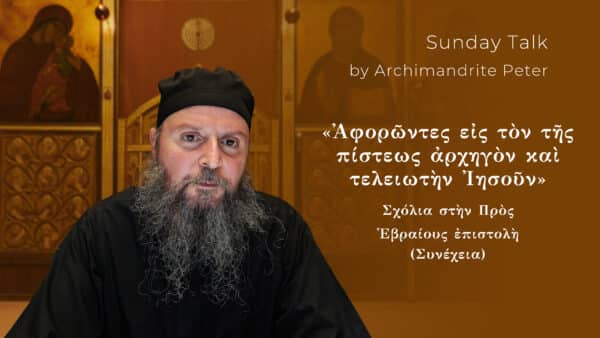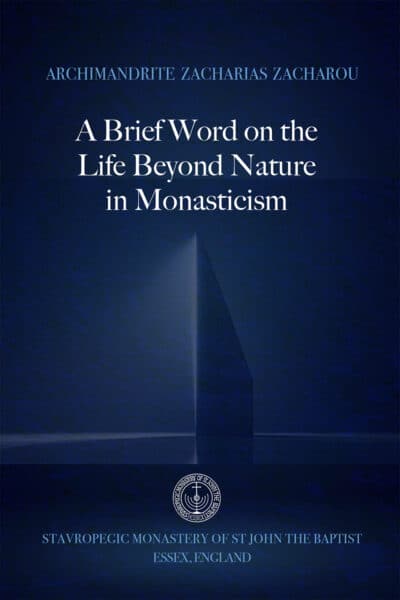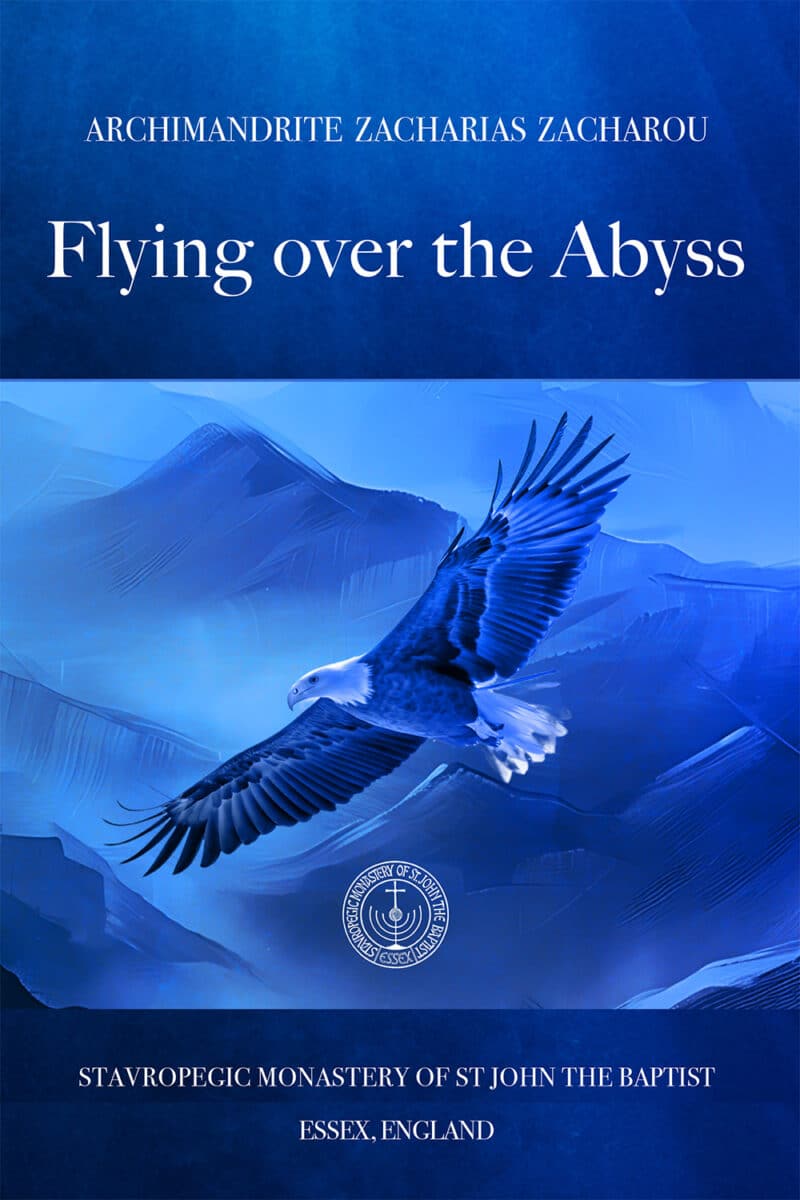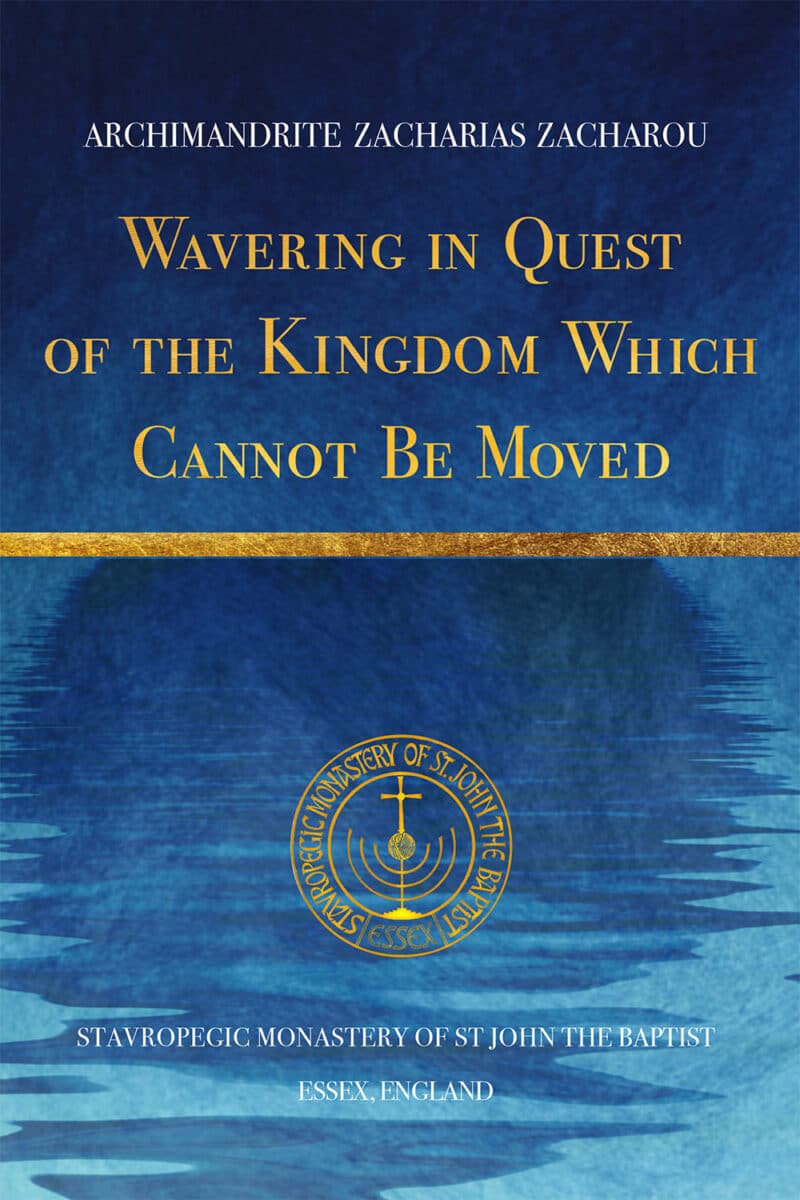Which of Archimandrite Zacharias’s 30 or so books should I buy?! That was my problem on my last visit to the monastery in Lent of this year. The physical aspects of all the books were so attractive: the beautiful colours of the cloth-bound volumes, with their coloured embossing, the striking variations-on-a-theme of the dust-jackets – and even the varied coloured ribbons!
But it was two provocative recent titles that hooked me in the end: the vision of one –Flying over the Abyss– and the paradox of the other –Wavering in Quest of the Kingdom Which Cannot Be Moved-, but especially the opening paragraph of Archimandrite Peter’s Prologue that sold the books to me: ‘An abyss of love was planted in the heart of man when God created him … A bottomless gulf separated man from his Creator .. An abyss of mercy was shown to man by Christ.’
This abundance of writing represents an extraordinary fruitfulness – truly ‘a hundredfold’ – on the part of someone who spent twenty-seven years in the monastery alongside Saint Sophrony, and who in the spirit of faithful apostolic and monastic succession transmits with profound gratitude Saint Silouan’s and Saint Sophrony’s teachings in a series of chapters in ‘question and answer’ style – which lends the book a lovely, informal, intimate air of fire-side heart-to-hearts between friends.
In Flying over the Abyss we head straight into the mysterious theme of the ‘Blessed Despair’ (or ‘charismatic despair’) of which Silouan and Sophrony both wrote, which confronts the void, leads to repentance, engenders real hope, and strengthens us to bear in ourselves ‘the dying of the Lord Jesus’1 Archimandrite Zacharias, Flying over the Abyss, p. 18 . He distinguishes clearly between (e.g.) charismatic and psychological despair2 Ibid., p. 25 , psychological and spiritual tears3 Ibid., p. 79 , and spiritual and psychological tension4 Archimandrite Zacharias, Wavering in Quest of the Kingdom Which Cannot Be Moved, p. 68 .
Flying over the Abyss
This ability to combine a life founded on prayer in the Spirit with wide-ranging theological study in ‘The Science of the Discernment of Thoughts’5 Flying over the Abyss, p. 105 is fundamental for the ministry of the spiritual Father, by contrast with so much unanchored DIY spirituality fed from therapeutic streams outside Orthodoxy. Rather, ’big tears’6 Ibid., pp. 37, 41, 60 or ‘rivers of tears’ wash away every impurity. Fr Zacharias displays not only a deep love for and dependence on Scripture (‘From the beginning of my conversion, I felt a great attraction to the word of God’7 Ibid., p. 241 ), but also a profound acquaintance with the entire monastic stream, above all the Philokalia and St John Climacus.
And yet his writing style is totally transparent: he often mentions his own experience in a typically self-deprecating way; he answers interesting questions head on, offers tender informal suggestions for private prayers, and is always deeply realistic about our human lives: ‘The passions still have dominion over us because we live in a world which lies in evil, and we suffer its influence’8 Ibid., p. 45 .
This is where Wavering in Quest of the Kingdom Which Cannot Be Moved has been so interesting and stimulating for me personally: I have never found such illuminating reflections on stability and instability as here. The juxtaposition of ‘wavering’ and ‘cannot be moved’ in the title is intended to be thought-provoking, and so the volume begins, ‘We experience many fluctuations in the spiritual life.’ But ‘God allows this instability’9 Wavering in Quest of the Kingdom Which Cannot Be Moved, p. 13 ; ‘we must not despair when we are down and we must not glory when we are up, for whether we live or die we are the Lord’s’10 Ibid., p. 14 . ‘We do not even need stability. The instability we experience teaches us a great mystery’11 Ibid., p. 15 ; ‘we need instability in order to understand the truth of God’12 Ibid., p. 19 . I had never thought that the ‘ups and downs’ of life conceal a Christological mystery: we descend and rise with Christ; we share his humiliation and his resurrection. This is a great liberation and revelation.
Wavering in Quest of the Kingdom Which Cannot Be Moved
But not surprisingly, The Eros of Repentance of which Archimandrite George Kapsanis wrote features strongly in this volume, closely accompanied by – indeed, inseparable from – tears. This is ‘The Wondrous Narrowness of the Monastic Path’13 Ibid., p. 81 , so that through the ‘earthquake of repentance’ … ‘we become bearers of the Holy Spirit’14 Ibid., p. 75 ; ‘repentance is like a circle of fire around the monk’15 Ibid., p. 175 , so that ‘Only when I weep before God do I feel that I am truthful’16 Ibid., p. 77 .
There is such a delight in truth here, such humility, such openness of heart, such wisdom, such commitment to living out the enormous, indivisible scope of Christian dogma and truth (as Saint Sophrony taught, ‘Christianity without dogma is mere morality’;17 Ibid., p. 158 ). It has been a real pleasure to get to know Archimandrite Zacharias so much more through these books than in many years of visiting the monastery. My only quandary now is which of the remaining volumes I should turn to next!
Footnotes
- 1Archimandrite Zacharias, Flying over the Abyss, p. 18
- 2Ibid., p. 25
- 3Ibid., p. 79
- 4Archimandrite Zacharias, Wavering in Quest of the Kingdom Which Cannot Be Moved, p. 68
- 5Flying over the Abyss, p. 105
- 6Ibid., pp. 37, 41, 60
- 7Ibid., p. 241
- 8Ibid., p. 45
- 9Wavering in Quest of the Kingdom Which Cannot Be Moved, p. 13
- 10Ibid., p. 14
- 11Ibid., p. 15
- 12Ibid., p. 19
- 13Ibid., p. 81
- 14Ibid., p. 75
- 15Ibid., p. 175
- 16Ibid., p. 77
- 17Ibid., p. 158






